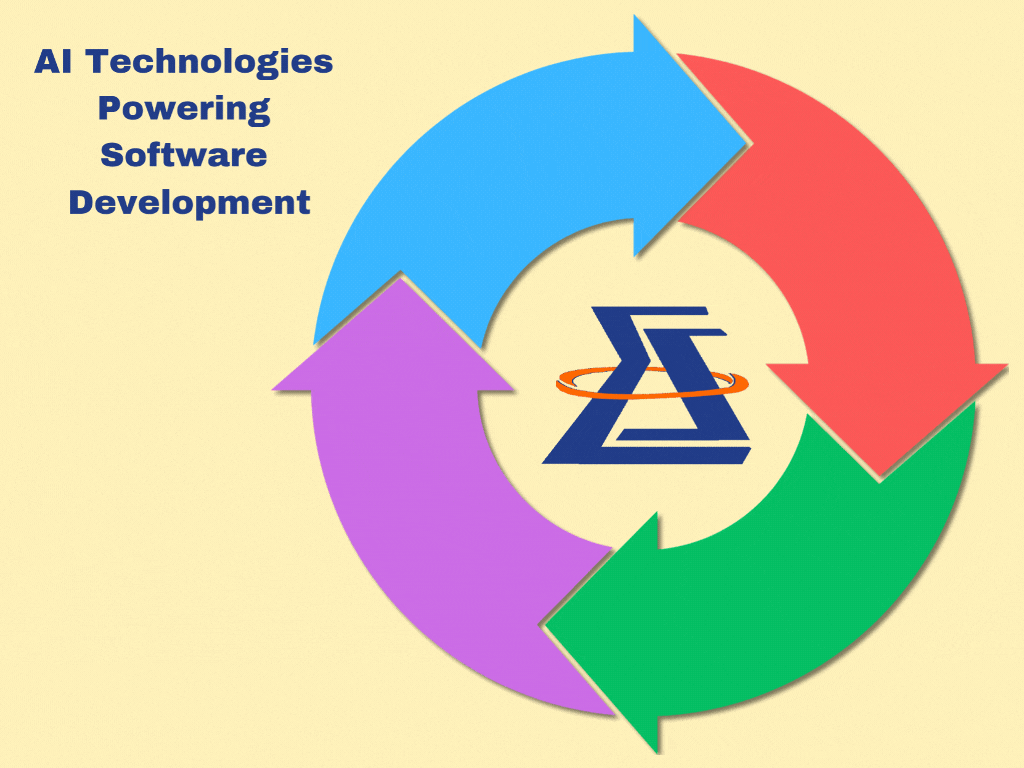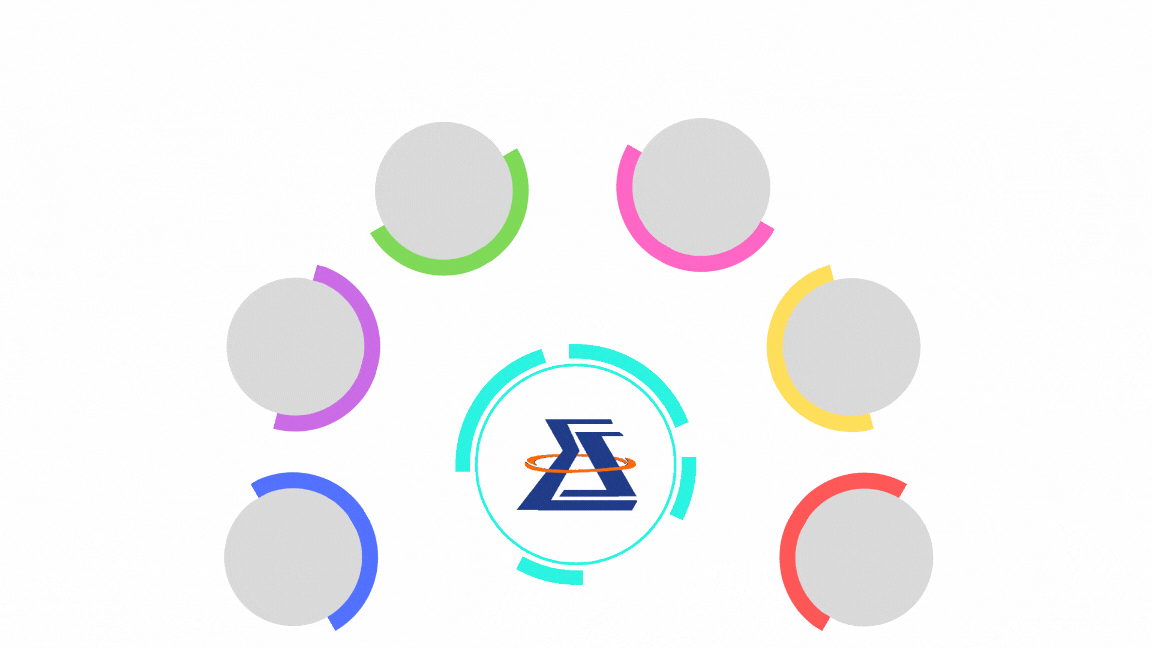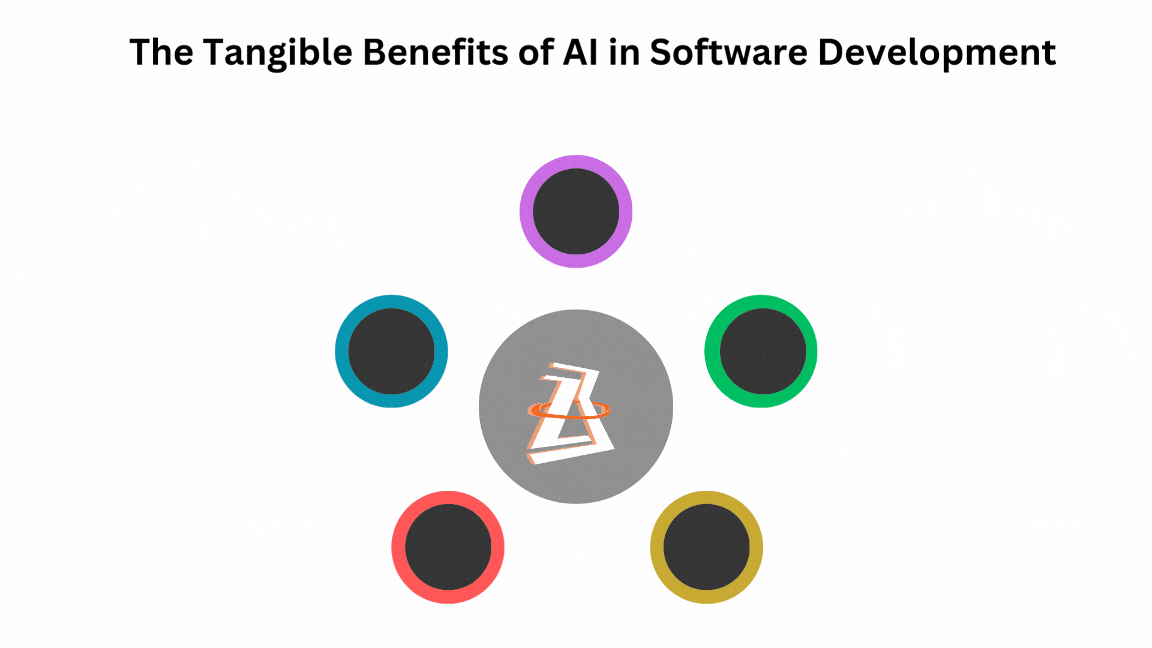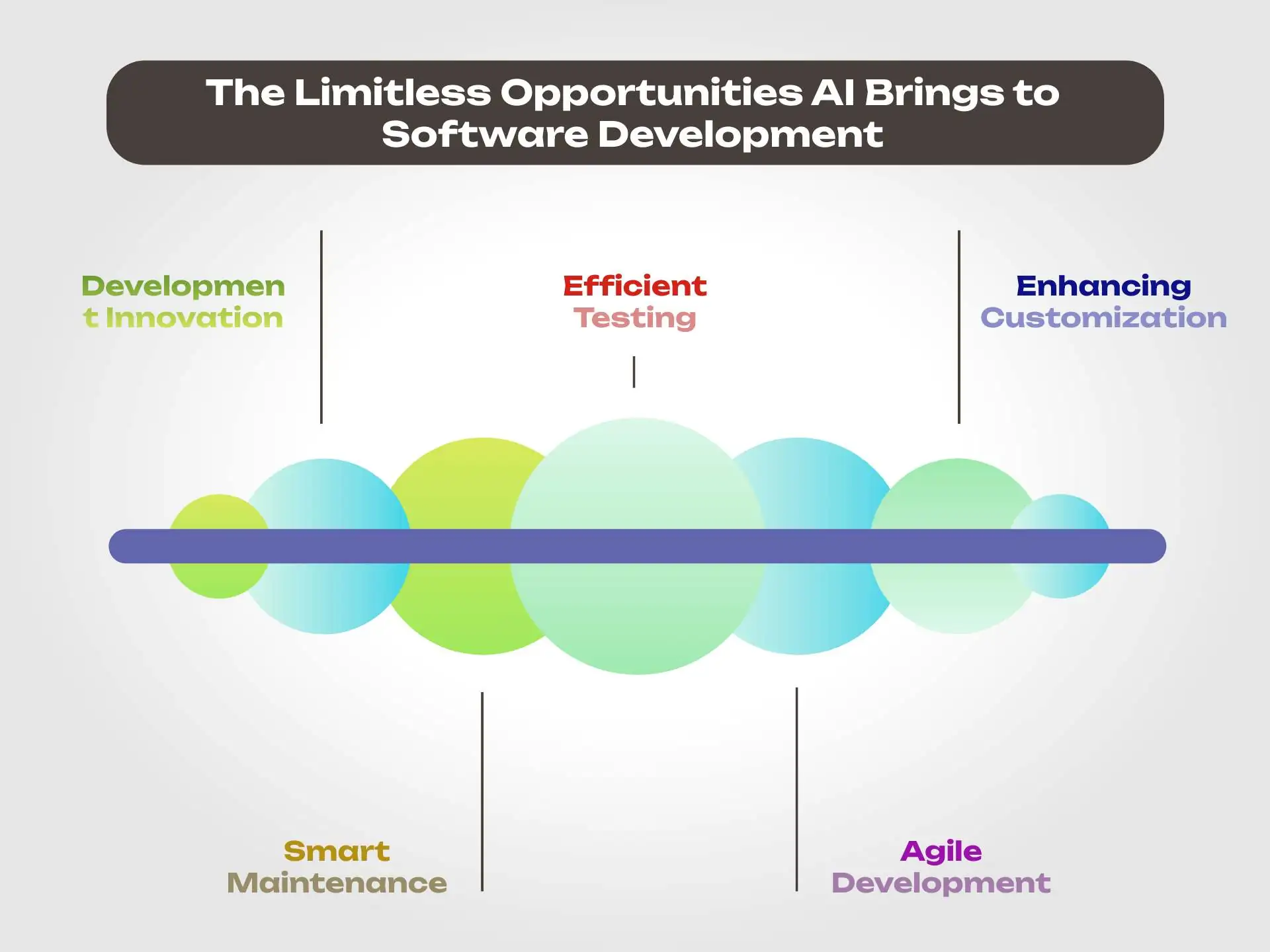AI in Software Development: Benefits, Challenges, and Future Opportunities
Introduction
Asking if you have used chatGPT is rude nowadays. Most of us do, but not for software development. AI in software development has big advocates and a great agency. It is one of the fastest-growing software development trends in 2024. The Grand View Research expresses surprise over AI’s growing dominance in software development to the tune of an astonishing 37% between 2023 and 2030.
Believe it or not, AI is changing how we work and how we cook, and AI in the software development trend will continue in 2025 and beyond. Tech leaders, software developers, and enthusiasts are adapting to this new avenue for multiple reasons besides its being cost-effective. At Sigma Solve, we continuously explore new opportunities to learn and apply emerging technologies. We have been developing applications by integrating AI into software development and leading the trends. Let’s look at the various possibilities and define AI strategies for software development.
Contextualizing the Topic
The term Artificial Intelligence (AI) is no longer something far off in the future but a force with which software development can and is being reshaped. From coding assistants to algorithms, AI-enabled software development is bringing efficiency, innovative, and intelligent software solutions.
Why It Matters
AI consumption in software development is not just a phenomenon of the contemporary era; it is an essential tool applicable to every developer. The creative promise of AI in software development tools implies that the ways we think, build, test, and deliver software are changing for the better.
The Objective of Our Exploration
This thorough manual will consider artificial intelligence’s application in software development. In this tutorial, we will overview how machine learning, AI tools, and intelligent algorithms are transforming traditional software development approaches and what opportunities and risks can be expected.
Defining AI in Software Development
What is AI in Software Development?
AI is shifting software production from a static, application-based model of shape to an extensive, flowing system in which code is anything but simple—it learns, evolves, and adapts with greater levels of abstraction.
Artificial intelligence-integrated software development is a relatively unconventional approach in which humans and AI work together to design better and enhanced software solutions.
AI Technologies Powering Software Development

Machine Learning (ML)
Artificial intelligence allows the software to improve its function through data experience without programming. In software development, source code patterns are analyzed, future bugs are found, and possible optimizations are suggested, making development brighter.
Natural Language Processing (NLP)
NLP is a language interface between human and computer programming languages. Natural Language Processing (NLP) in development can also enable programmers to code as they speak, translate between specification and code, and improve relations between different software development teams.
Deep Learning
Deep learning enables the formation of a nerve network that can perform like the human brain. These networks can create complex structures in software, determine its behavior, and generate new ideas in development by analyzing the underlying pattern of the codes.
Robotic Process Automation (RPA)
RPA can be employed as a unique tool for automating all the monotonous work associated with software development. Performing raw coding relieves developers of the need to assume more high-level work, such as optimal problem solving, proper planning, and designing better innovative software solutions.
How AI Enhances the Development Lifecycle
AI-powered development tools are revolutionizing every stage of software creation. In software development, automation incorporated in artificial intelligence is helping developers by making intelligent design recommendations, testing software automatically, and predicting when equipment needs repair or replacement, among other benefits.
AI-Driven Development Tools
Code Completion
Other code completion applications, like GitHub Copilot for developers, instantly enhance the prompt with suitable code and significantly reduce working time. These intelligent assistants cope with the context, possible developer intentions, and the generation of the correct, syntactically accurate code snippets.
Automated Bug Detection
Automating code reviews of software testing tools is programmed to find areas within the code that can lead to bugs and other severe problems. These improved systems are intelligent; they are trained through prior code repository sources, enhancing the kind of errors seen and prevented.
Predictive Code Generation
Currently, where ordinary programmers are capable of writing simple lines of code, advanced AI algorithms can create entire modules of the project in question. These tools learn from other code bases and the patterns of coding that exist in software development cycles and automatically write sound code with the least human interference.
The Power of AI in Software Development: Key Applications

Many software technologies that reflect some amount of artificial intelligence are on the rise, helping developers design, improve, and support applications. By leveraging AI-powered development tools, teams can dramatically improve efficiency, reduce errors, and unlock unprecedented innovative potential.
Automating Repetitive Tasks in Software Development
AI-enabled software development dramatically reduces manual coding efforts by automating repetitive tasks. Through intelligent algorithms, it is possible to develop code, check syntax, and redesign existing code with incredible accuracy and in a very short time.
Top AI-Powered Automation Tools
GitHub Copilot
Graduated AI coding math assistant that proposes entire lines of code or function blocks. It uses millions of open-source repositories to learn from and serves relevant code suggestions that allow developers to become better decision-makers.
Tabnine
AI code completion is a well-developed tool based on deep learning that predicts and generates code. It is efficient, can handle numerous programming languages, and accommodates the programmer’s style.
OpenAI Codex
A highly effective advanced intelligent agent that interprets natural language into functional code. It can grasp the complexity of any programming need and then turn out the correct and optimum code in any language or framework.
AI in Code Quality and Error Detection
Artificial intelligence in coding has transformed error detection, enabling developers to identify and resolve potential technical glitches, bugs, and security-related vulnerabilities before they haunt them. AI-powered code checkers offer detailed checking capabilities of the codes, and this comes with high-end accuracy.
AI-Driven Quality Assurance Tools
DeepCode
A deceptively simple, brilliant tool that informs Jewelry through machine learning about various data in code repositories. It marks and locates possible bugs, security threats, and performance problems, indicating practical steps for developers.
Amazon CodeGuru
An artificial intelligence-based CodeReview service that provides better suggestions about code quality improvement. It profiles the application utilization and offers concrete hints and recommendations on how to fine-tune the application and follow the best practices.
Predictive Coding with Machine Learning
Machine learning in software development enables predictive coding, where AI models anticipate potential software issues and suggest optimizations. These intelligent systems learn from large code repositories to give life to predictive development solutions.
Predictive Analytics in Software Development
Predictive analyses using AI can estimate the possibility of future performance declines, threats to security, and potential issues with scalability. By evaluating past data and code, these tools assist developers in producing better and longer-lasting software solutions.
Natural Language Processing (NLP) for Enhanced Documentation
Natural Language Processing as an application restores software documentation to be clear and all-encompassing without the need for human input. Due to NLP tools, precise specifications, and technical specifications can be converted into formal and easy-to-read, developed, and understood structures for developers and users.
AI in Testing and Debugging
The application of AI tools for software testing shifts quality assurance and control due to several testing difficulties. Innovative testing tools can supply different test cases and find potential bugs while offering full test coverage with little human involvement.
AI Testing Platforms
A test automation tool based on artificial intelligence and machine learning approaches can design test cases automatically. It can mimic users and identify problems with UI, run a test, and deliver complete cycles of app usage across devices.
Functionize
An intelligent testing framework that makes use of machine learning to design, execute, and manage testing automation. It can handle the dynamism of the application systems interfaces and offer testing reports with intelligence.
Insight
Artificial intelligence is closely connected with the future of software development. That is why developers of the new generations are embracing the idea of utilizing intelligent tools based on AI technologies and will become pioneers of further technological advancements.
The Tangible Benefits of AI in Software Development

Software development is slowly shifting from a complex, huge, and slow process to an intelligent and fast ecosystem. AI-powered development tools are delivering measurable benefits that revolutionize how software is created, tested, and maintained.
Increased Development Speed and Efficiency
AI-enabled software development services dramatically accelerate coding processes by automating repetitive tasks, reducing manual intervention, and providing intelligent code suggestions that significantly cut development time.
Compelling Statistics and Case Studies
Industry Productivity Statistic
A recent McKinsey study suggests that AI increases developers’ productivity by almost 50% as it curtails coding time and solves errors quickly.
Enterprise Efficiency Case Study
Several internal studies by Microsoft provided data that indicated that developers who incorporated GitHub Copilot as an IDE partner coded 55% faster and that up to 40% of the code a typical developer writes could be produced by the tool, thus cutting development time in its tracks.
Startup Innovation Case Study
A San Francisco-based AI software development company in the USA demonstrated that by implementing AI-powered development tools, they reduced project timelines by 30% and decreased bug-fixing costs by 25%.
Global Technology Adoption Statistics
A Gartner report reveals that by 2028, 75% of software developers will be using Code Assistants, compared to less than 10% in 2023.
Improved Code Consistency and Reliability
Machine learning in software development ensures unprecedented code consistency by analyzing and learning from existing code repositories. Tools can be used to pick up and banalize such coding styles to ensure that people make few mistakes and that the levels of coding remain consistent.
Machine Learning Code Optimization
Intelligent algorithms work in real-time from codebase scans to determine better practices and optimize for improvements. These AI-powered development tools can:
Detect inconsistent coding styles
Suggest standardized approaches
Automatically refactor complex code segments
Ensure compliance with industry best practices
Cost Efficiency in Development and Maintenance
Artificial intelligence in software development significantly reduces overall project costs by:
Automating repetitive coding tasks
Minimizing manual testing efforts
Preventing expensive bug fixes in later stages
Reducing the need for extensive manual code reviews
Collaboration Enhancement and Team Efficiency
AI-driven software automation tools transform team collaboration by:
Facilitating knowledge sharing across distributed teams
Creating intelligent documentation
Enabling seamless communication between developers
Breaking down complex technical barriers
Real-Time Feedback for Developers
AI-powered tools offer instantaneous, intelligent feedback to developers, enabling:
Contextual code improvement suggestions
Performance optimization recommendations
Proactive security vulnerability identification
Continuous learning and skill enhancement
Insight
The integration of AI in software development does not come as a cameo but has a full-fledged role to play in how we create, maintain, and innovate technological solutions. Those who adopt such intelligent development tools will be the pioneers of future software advancement.
The Limitless Opportunities AI Brings to Software Development
AI is creating uncharted opportunities in the software development life cycle and in how ideas are conceived, implemented, and advanced. AI-powered development tools are not just changing tools—they’re reshaping entire development paradigms.

AI-Powered Innovation in Software Solutions
Artificial intelligence in software development is breaking traditional boundaries, enabling developers to create intelligent, adaptive software solutions that were once considered impossible. It sees the possibility of developers building applications to predict user needs and behavior, intelligent virtual assistants that are capable of learning their users and their needs, and optimal reactions to being used.
Breakthrough Innovations
Key innovative applications include:
Predictive healthcare diagnostics
Intelligent financial forecasting systems
Advanced autonomous vehicle software
Real-time language translation platforms
Personalized educational technology
Smarter and More Efficient Software Testing
Machine learning in software development revolutionizes testing strategies by introducing intelligent, adaptive testing methodologies. Automobiles can use the functions AI-driven software testing tools offer, such as the ability to analyze previous test results, determine complicated edges, and automatically perform complicated test scenarios with higher precision.
AI Testing Capabilities
Advanced AI testing features:
Automatic test case generation
Intelligent error prediction
Complex scenario simulation
Performance bottleneck identification
Continuous learning and optimization
AI-Driven Agile Development
AI-enabled software development transforms Agile methodologies by providing data-driven insights, intelligent sprint planning, and adaptive project management. These AI-powered development tools help teams make more informed decisions, optimize workflows, and respond quickly to changing project requirements.
Agile Enhancement Strategies
AI improves Agile processes through:
Predictive sprint planning
Resource allocation optimization
Risk assessment and mitigation
Performance trend analysis
Real-time project health monitoring
Enhancing Customization and Personalization
Artificial intelligence in coding enables unprecedented levels of software personalization. AI can learn and capture users’ behaviors, practices, and interactions and apply this intelligence to alter software’s appearance, procedures, and interfaces.
Personalization Techniques
AI-driven personalization approaches:
User behavior pattern recognition
Contextual interface adaptation
Predictive feature recommendations
Individual user experience optimization
Real-time content customization
Smarter Software Maintenance
AI makes software maintenance go from reactive to proactive. In terms of its benefit, AI facilitates the presentation and prevention of probable problems, the recognition of violent performance, and the promotion of prospective updates of software as a staunch shield.
Continuous Improvement Mechanisms
AI maintenance strategies include:
Predictive system health monitoring
Automatic performance optimization
Security vulnerability detection
Intelligent update scheduling
Resource consumption analysis
Insight
The future of software development is one umbrella that defines artificial intelligence (AI). AI is on the path to becoming intelligent tools, and developers are now preparing to get busy with these bright things as they develop the next generation of technologies with applications that will become increasingly adaptive and intelligent and do whatever the user wants.
Real-World Case Studies: Leading the Way in AI-Powered Software Development
Software development teams in large corporations and new-born startups experience AI disruption. These real-world examples showcase how AI-enabled software development is revolutionizing technology creation, deployment, and user experience.
Google’s AI Solutions for Developers
As a pioneer, Google realized AI impact on software development and developed groundbreaking tools that demonstrate the power of artificial intelligence in software development. Their AI-powered development tools are reshaping how developers create, test, and optimize software solutions.
Key AI Innovations at Google
TensorFlow: Machine Learning Powerhouse
TensorFlow helps developers to construct and train sophisticated machine learning algorithms in an environment that has never been easier. This is an open-source application capable of supporting detailed AI variations within numerous areas of application, including mobile application development and multisectoral scientific studies.
Cloud AI Platform
Google’s Cloud AI offers great potential for developers seeking highly effective methods of predictive analysis. It helps teams:
Generate intelligent code suggestions
Automate complex testing processes
Create adaptive software solutions
Optimize development workflows
Implement advanced machine learning models
Microsoft and AI-Powered Developer Tools
Microsoft has successfully blended Artificial Intelligence into the development environment by creating tools that fundamentally transform the productivity and quality of developed applications.
Microsoft’s AI Development Arsenal
Visual Studio IntelliCode
An AI-assisted development tool that provides:
Contextual code completions
Intelligent code recommendations
Automated error detection
Personalized coding suggestions
Enhanced developer productivity
GitHub Copilot
A revolutionary AI pair programmer that:
Generates entire code blocks
Understand context and intent
Supports multiple programming languages
Learns from the developer’s coding style
Accelerates development processes
Netflix’s AI-Driven Content Personalization
Netflix shows how the successful integration of AI and ML in software development can produce disruptive user experiences. It constantly monitors user habits, enhances the suggestion of materials to display, and optimizes the software.
AI Personalization Strategies
Recommendation Engine
Analyzes viewing history
Predicts user preferences
Creates personalized content suggestions
Adapts in real-time
Improves user engagement
Software Performance Enhancement
Monitors system performance
Predicts potential issues
Automates testing processes
Ensures a smooth streaming experience
Continuously improves infrastructure
AI Adoption by Startups for Agile Development
Startups are tapping into software automation to enable new entrants to disrupt incumbents and develop distinctive, innovative solutions using AI in Agile development.
Startup AI Innovation Strategies
Rapid Prototyping
Use AI for faster design iterations.
Generate multiple solution concepts.
Reduce development time
Lower implementation costs
Increase innovation potential
Intelligent Resource Allocation
Optimize team productivity
Predict project challenges
Automate routine tasks
Enhance decision-making
Maximize development efficiency
Insight
Both of these case studies demonstrate that AI is not a trend in the technology field but rather a paradigm shift in software engineering. Companies that embrace the use of AI-based development tools will be the ones that pioneer technological innovation in the next generation of technology and produce more intelligent, adaptive, and efficient software solutions.
Conclusion: Embracing AI for a Future-Ready Software Development Workforce
The journey through AI in software development reveals a transformative landscape where technology and human creativity intersect. Thus, reviewing the enormous possibilities of artificial intelligence, it remains to state that the integration of these kinds of technologies is no longer a question of whether but how to increase the company’s chances in the modern, constantly developing technoscape.
Summary
AI-enabled software development brings remarkable advantages. From automated bug detection to code generation, AI assists developers in innovative and efficient work. Nevertheless, it has a long list of promising prospects for medical innovation compared to numerous difficulties.
Key insights include:
It erases mundane code-writing activities.
ML facilitates more predictable and responsive approaches to software development.
Developers can solely concentrate on those valuable strategic problems for solutions.
How to Get Started with AI in Your Development Process
AI aficionados anxious to incorporate it in coding should begin step by step. Experiment with AI-powered development tools like GitHub Copilot, explore predictive coding platforms and gradually incorporate machine learning techniques into your workflow.
Practical steps:
Pursue advanced learning in AI and ML through online courses.
Experiment with AI code completion tools
Join developer communities exploring AI technologies.
Attend workshops and webinars on AI implementation.n
Final Thought: AI as the Catalyst for Innovation
An AI software development company in the USA understands that machine learning in software development is more than a trend—it’s a revolution. Further development of AI, together with the existing and new emerging trends, is effectively going to burst open new opportunities that are yet to be discovered by us, or even how they are going to redefine the very ways we think, design, and apply technologies in the ever-changing world.
Today’s generation of leaders should be open to new ideas, always absorb new knowledge, and see AI as a co-worker in creativity. They ought to maintain a spirit of curiosity and versatility and seek to be receptive to different things to capture AI’s unique capabilities and strength in delivering outstanding digital solutions.